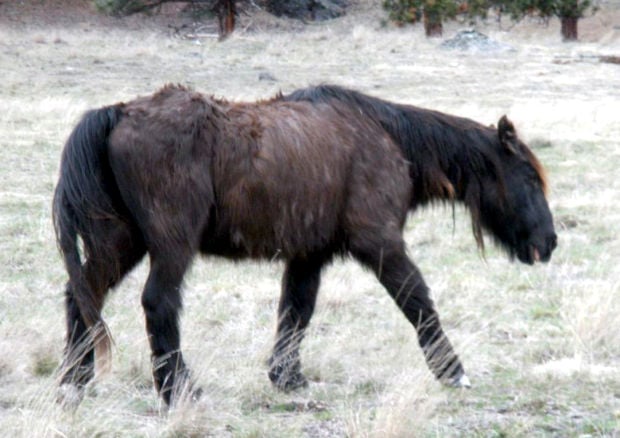I am so sad that this AMAZINGLY old horse died! :-( But I am glad that he was free and was able to live his life. ~Declan
Oldest Horse On Flathead's Wild Horse Island Dies
Having roamed Flathead Lake’s largest island for more than three decades, at one point upholding its name as the lone equine resident, the oldest gelding on Wild Horse Island has departed for greener pastures.
“It’s too bad, but he had a pretty good run,” says Jerry Sawyer, who manages the seven state parks located on Flathead Lake for Montana Fish, Wildlife and Parks. “It’s pretty rare that they get that old. And he just kept hanging in there.”
Every winter, the old man’s ribs became a little more pronounced, his winter coat a few degrees more tattered, and wildlife managers grew increasingly certain that it would be his last.
And then, with spring’s arrival, he would emerge to prove his tenacity again.
“He was there a long time,” Sawyer said. “He had been shedding his winter coat and his metabolism was slowing down. He came across as really wild and wooly, and that was certainly a sign that he wasn’t going to keep going. He did have pretty good habitat, though, with plenty of forage, and the predators are pretty slim out there. There are coyotes and a few mountain lions. He did well.”
Longtime Wild Horse Island resident Barry Gordon last saw the old horse around the first of December, and said he was looking weaker than he had at the beginning of previous winters.
“He really hung in there,” Gordon said. “He was always the wildest of all the horses that we have out here. You never could get up next to him, but he was always the one that watched over the rest of them. He just finally gave her up.”
The old horse’s death leaves five mares and one gelding, a population that still outweighs what is technically allowed by Wild Horse Island State Park’s management plan – a maximum of five wild horses to run free on the island’s 2,164 acres. The island also supports significantly higher numbers of bighorn sheep and mule deer.
FWP, which has to transplant bighorn sheep off the island to keep their population in check, has one major rule for the wild horses, which are present solely to honor the island’s name. They can’t reproduce.
That’s meant the males on the island, like the oldest horse, must be geldings.
In 2009, the herd of wild horses dwindled to only the old man, and FWP began restocking, first adding a mustang because they didn’t think the old horse could make it through another winter. When he did, they added four wild black mares – the first females FWP had ever transplanted to the island.
Unbeknownst to anyone, one of the mares was pregnant, and one day a seventh horse appeared on the island. According to Gordon, the old horse was protective of the young filly.
“He was the one that kind of ran the show,” Gordon said. “He was quite protective of that little filly. When visitors would get near her he would start snorting. He was quite protective of that little girl.”
The herd tends to forage on Wild Horse Island’s east side in the morning and migrate to the western edge to follow the sun. Sawyer said the rest of the herd is faring well, and estimates that the old horse died at least a month ago.
“You can’t live forever, but he did pretty good,” Sawyer said. “You’ve got to give him credit.”
